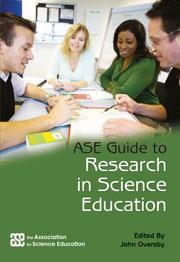Odilla Finlayson reviews this guide to thinking about and constructing research
ASE guide to research in science education
John Oversby (ed)
Hatfield, UK: The Association for Science Education 2012 | Pp248pp | £27.00 (Members: £21) | ISBN9780863574290
Reviewed by Odilla Finlayson

Connecting the outputs of research in science education to classroom practice is an ongoing challenge. A solution to this has now been presented in the ASE guide to research in science education. In-service and pre-service science teachers, new researchers in science education and those already experienced in this area now have a very accessible book showing the value and impact of science education research on the learning community.
This book has contributions from a range of authors - science education researchers, teachers and academics. It consists of two sections: Section 1 focuses on a thematic review of research in science education while Section 2 deals with conducting research.
Section 1 has eighteen well-written and concise chapters, each of which addresses a particular theme. They present a good overview of key research findings as well as raising some ongoing questions. Most of the chapters are written about issues within classrooms, at both primary and secondary level (but also applicable at tertiary level). Issues covered include the nature of science, pedagogical content knowledge, learners’ ideas, group work, practical work, formal and informal learning. In particular, a number of these chapters address the competences and practices of science teachers - knowledge of science, use of creativity in teaching science, use of scientific inquiry and assessment approaches.
Section 2 (about one third of the book) presents a practical, clear, readable and well-constructed guide to getting started in research. It is particularly useful for those who wish to critically examine changes within their own classrooms.
In my opinion, this book is extremely well written and informative it serves as an excellent overview of current outputs of science education as reported in international literature. As it is presented in distinct themes, the reader can focus on a particular issue, ie it does not need to be read in sequence and the reader can delve in as necessary.
It serves as an excellent resource and guide for all educators, both practioners and researchers, and will certainly be a valuable resource for teachers who wish to use research outputs to inform their practice.
Related Links
ASE guide to research in science education
Purchase this resource






No comments yet